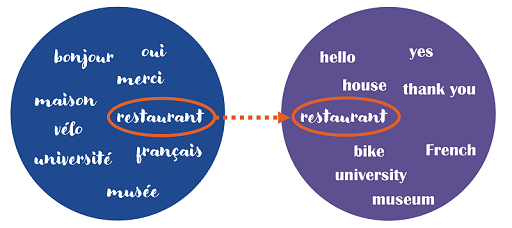1 What do I know already?
When you learn French as a beginner, you will practise quickly spotting words that you can easily understand or recognise. This includes French vocabulary which has transferred to other languages such as English – like the example in Figure 2.
In this first activity, think about any French vocabulary that you already happen to know.
Activity 1 What French do you know?
See if you can list a few words or short phrases in French in the box below.
Discussion
Well done if you came up with a few French words or phrases! Don’t worry if you couldn’t think of much – you may realise soon that you know more than you think.
Building on this, see how you get on with the next activity – perhaps it will contain some of your words from Activity 1.
Activity 2 French loan words
Here is a paragraph containing various words used in the English language, which actually originate from French. See if you can identify them – click to highlight the words before revealing the answer. There are ten in total.
You probably found that many of the words highlighted in Activity 2 are recognisably French in origin. Words like this are used in English all the time. They’re referred to as ‘loan words’ or ‘borrowings’. Sometimes, the original word expresses something that does not fully carry over to the language that is doing the ‘borrowing’. Being used within a different language, over the course of time, loan words can change slightly in meaning, according to the context in which they are used.
Consider, for example, the word ‘baguette’ – what comes to mind? How many possible meanings does the word have? In English it is only used to refer to a stick of bread, whereas in the French language it can also refer to different types of stick or baton: for example a chopstick, or a wand (une baguette magique).
The study of the history of words – their origins and how their meanings have developed – is called etymology. If you’re interested in the etymology of words, you will find some details listed in a good-sized dictionary. The next activity introduces some etymological information with the example of a few loan words.
Activity 3 Matching etymology
See if you can match these words to their relevant etymological information.
Two lists follow, match one item from the first with one item from the second. Each item can only be matched once. There are 4 items in each list.
-
restaurant
-
café
-
dessert
-
chef
Match each of the previous list items with an item from the following list:
a.Borrowed from French, referring to the ‘head’ of a kitchen.
b.Borrowed from French meaning ‘coffee’ or ‘coffee shop’.
c.Borrowed from French verb meaning ‘to restore’, or food that restores one’s strength.
d.Borrowed from French verb literally meaning ‘to remove what has been served’, at the end of a meal.
- 1 = c,
- 2 = b,
- 3 = d,
- 4 = a
Discussion
Well done if you matched them up! Here is a little more detail on some of these etymologies:
Restaurant – this is borrowed from the present participle of the French verb ‘restaurer’.
Dessert – the French verb referred to here is ‘desservir’.
Chef – this is borrowed from the French ‘chef de cuisine’, meaning head of the kitchen. ‘Chef’ here is originally derived from the Latin ‘caput’, meaning ‘head’.


